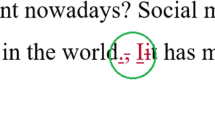Abstract
Framed by dialogic theory, this study examined the ways in which four grade eight students' revisions to their writing were influenced by peer feedback from informal interactions while writing a narrative and from a peer response group. Transcripts of students' talk were analyzed to determine the functions and topics of the peer feedback. Peer feedback in both settings influenced students' revisions at the word, sentence and organizational levels, although students made many more revisions to their writing than could be directly traced to the feedback. The peer talk that influenced the students' revisions served four functions: playing with ideas, clarifying ideas, questioning plausibility, and showing emotional response.
Similar content being viewed by others
REFERENCES
Bakhtin,M.M. (1973). Problems of Dostoevksy's poetics (R.W. Rotsel, Trans.). Ann Arbor, Michigan: Ardis.
Cazden, C. (1988). Classroom discourse: The language of teaching and learning. Portsmouth, New Hampshire: Heinemann.
Dyson, A.H. (1995). Writing children: Reinventing the development of childhood literacy. Written Communication, 12(1), 4–46.
Dyson, A.H. (1997). Writing superheroes: Contemporary childhood, popular culture, and classroom literacy. New York: Teachers College Press.
Freedman, S.W. (1992). Outside-in and inside-out: Peer response groups intwo ninth-grade classes. Research in the Teaching of English, 26(1), 71–107.
Gere, A.R. & Abbott, R.D. (1985). Talking about writing: The language of writing groups. Research in the Teaching of English, 10(4), 362–381.
Gere, A.R. & Stevens, R.S. (1985). The language of writing groups: How oral response shapes revision. In S.W. Freedman (Ed.), The acquisition of written language: Response and revision (pp. 85–105). Norwood, New Jersey: Ablex.
Graves, D. (1991). A fresh look at writing. Portsmouth, New Hampshire: Heinemann.
Harris, J. (1987). The plural text/the plural self: Roland Barthes and William Coles. College English, 49(2), 158–170.
Hedgcock, J. & Lefkowitz, N. (1992). Collaborative oral/aural revision in foreign language writing instruction. Journal of Second Language Writing, 1(3), 255–276.
Hewett, B.L. (2000). Characteristics of interactive oral and computer-mediated peer group talk and its influence on revision. Computers and Composition, 17, 265–288.
Ivanič, R. (1998). Writing and identity: The discoursal construction of identity in academic writing. Amsterdam: John Benjamins Publishing Company.
Kamberelis, G. & Scott, K.D. (1992). Other people's voices: The coarticulation of texts and subjectivities. Linguistics and Education, 4, 359–403.
Lensmire, T.J. (2000). Powerful writing responsible teaching. New York: Teachers College Press.
Lipka, R. (1997). Enhancing self-concept/self-esteem in young adolescents. In J.L. Irvin (Ed.), What current research says to the middle level practitioner (pp. 31–40). Columbus, Ohio: National Middle School Association.
Lockhart, C. & Ng, P. (1995). Analyzing talk in ESL peer response groups: Stances, functions, and content. Language Learning, 45(44), 605–655.
Mendonça, C. & Johnson, K. (1994). Peer review negotiations: Revision activities in ESL writing instruction. TESOL Quarterly, 27, 135–141.
Nystrand, M. (1986). The structure of written communication: Studies in reciprocity between writers and readers. Orlando, Florida: Academic Press.
Nystrand, M. (1990). Sharing words: The effects of readers on developing writers. Written Communication, 7(1), 3–24.
Nystrand, M. & Brandt, D. (1989). Response to writing as a context for learning to write. In C. Anson (Ed.), Writing and response: Theory, practice and research (pp. 209–230). Urbana, Illinois: NCTE.
Sommers, E. & Lawrence, S. (1992). Women's ways of talking in teacher-directed and student-directed peer response groups. Linguistics and Education, 4, 1–36.
Street, B. (1995). Social literacies: Critical approaches to literacy in development, ethnography and education. Harlow, UK: Longman.
Tang, G.M. & Tithecott, J. (1999). Peer response in ESL writing. TESL Canada Journal, 16(2), 20–38.
Villamil, O. & DeGuerrero, M. (1996). Peer revision in the second language classroom: Social cognitive activities, mediating strategies and aspects of social behavior. Journal of Second Language Writing, 3(1), 51–75.
Wells, G. (1999). Dialogic inquiry: Toward a sociocultural practice and theory of education. Cambridge, UK: Cambridge University Press.
Zhu, W. (1995). Effects of training for peer response on students' comments and interaction. Written Communication, 12(4), 492–528.
Author information
Authors and Affiliations
Rights and permissions
About this article
Cite this article
Peterson, S. Peer Response and Students' Revisions of their Narrative Writing. L1-Educational Studies in Language and Literature 3, 239–272 (2003). https://doi.org/10.1023/B:ESLL.0000003605.45224.b5
Issue Date:
DOI: https://doi.org/10.1023/B:ESLL.0000003605.45224.b5




